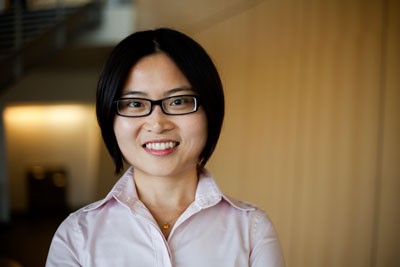Oftentimes when we think of focused ultrasound, we imagine using it to heat and kill tissue. Unlike thermal ablation, histotripsy uses focused ultrasound to mechanically disrupt the target tissue without heating. Histotripsy turns the tissue into liquid-appearing acellular debris – which is absorbed by the body over one to two months – resulting in effective tissue removal.
Histotripsy has been shown to stimulate a powerful immune response in cancer treatment studies. In the treatment of neurological diseases, transcranial histotripsy can produce well-confined focal treatment in a wide range of locations and volumes in the brain, offering the potential to increase the treatment envelope while decreasing treatment time.
Zhen Xu, PhD, discussed the basic mechanism, instrumentation, bioeffects, and applications of histotripsy. She also covered the latest preclinical and clinical trial results of developing histotripsy for the treatment of cancer and neurological diseases.
 Zhen Xu, PhD
Zhen Xu, PhD
Associate Professor and Associate Chair of Graduate Education, Biomedical Engineering, University of Michigan
Webinar: Histotripsy for Treatment of Cancer and Neurological Diseases
About the Speaker
Zhen Xu, PhD, is a tenured Associate Professor in the Department of Biomedical Engineering at the University of Michigan and a primary inventor and pioneer in histotripsy. She has received many notable awards, including from the IEEE Ultrasonics, Ferroelectrics, and Frequency Control Society, the American Heart Association, National Institutes of Health (NIH), the International Society of Therapeutic Ultrasound (ISTU), and the American Institute of Medical and Biological Engineering. She is currently an associate editor for three notable journals, an elected board member of ISTU, and a charter member of the US NIH study section. She is a principal investigator of grants funded by the Focused Ultrasound Foundation, NIH, American Cancer Association, Office of Naval Research, The Hartwell Foundation, and The Coulter Foundation. She received her PhD from the University of Michigan in 2005.
